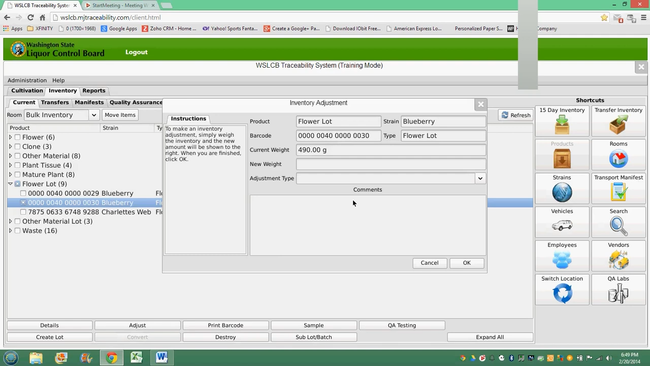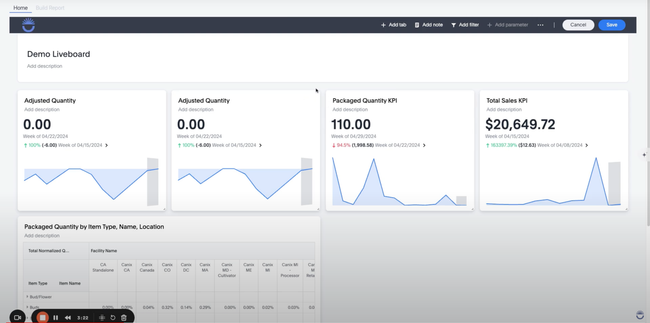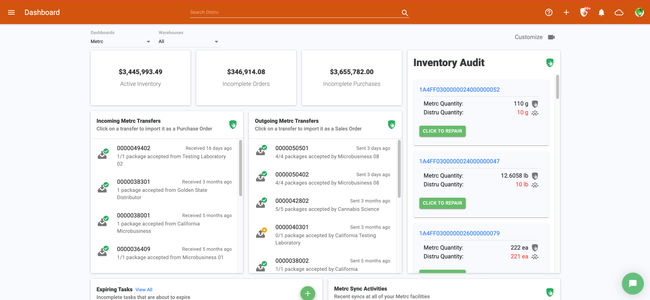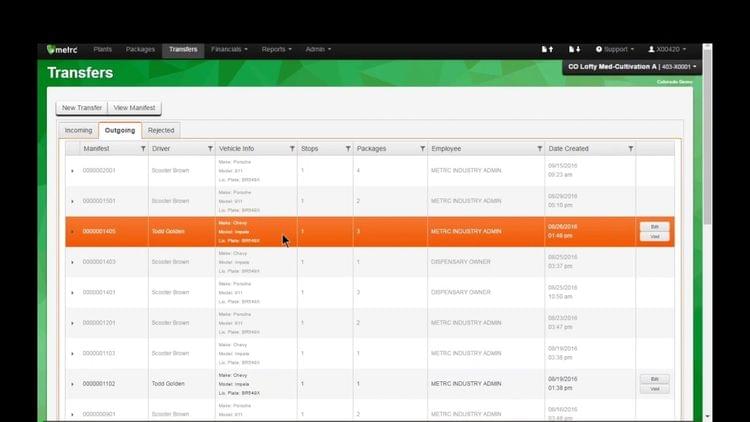The Best Seed-to-Sale Software
Seed-to-sale software helps cannabis businesses streamline all operations, from cultivation to retail. We’ve evaluated top platforms for functionalities like traceability, inventory tracking, and batch processing for companies of all sizes.

- Compliance with multiple state-based cannabis programs
- Strong cultivation module
- Reporting tools for compliance

- Mobile capabilities
- Hardware integrations (RFID)
- Customizable reporting

- Integrates with programs like Metrc and LeafLink
- Multiple users have reported responsive support
- Local support makes implementation/onboarding easier
The best seed-to-sale software complies with state and local regulations and manages cannabis operations from cultivation and harvesting to inventory tracking and point-of-sale transactions.
After researching and comparing the best products through our own independent review process, here are our top picks for seed-to-sale software:
- BioTrack: Best Overall
- Canix: Strong Mobile Capabilities
- Distru: Best for Mid-Market Companies
- GrowFlow: Best for SMBs
- Flourish: Advanced Tech Integrations
- MJ Freeway: Strong POS System
- Elevated Signals: Best GMP Compliance
- IndicaOnline: Best Delivery Management
- Metrc: Best Compliance Framework
BioTrack - Best Overall
BioTrack offers a comprehensive cultivation management module for growers. You can organize all growth data with custom plant tags and link clones to mothers. For each strain, monitor and take notes on its genealogy and potency to ensure each meets quality standards. This allows you to maintain desirable traits from one plant to the next.
The module also helps cultivators analyze data with advanced reporting and analytics. Access over 100 pre-built reports, including:
- Yields: View detailed plant productivity metrics, like yield per plant, square meter, and lighting watt. Use historical data to forecast future results.
- Forensics: Record the plant’s lifecycle and log all related activities, like fertilization.
- Strain ranking: Evaluate and compare the performance of different strains, such as yields, potency, quality, and growth characteristics, to identify the top plants.
From cultivation to final sale, BioTrack allows for full traceability to stay government-compliant. The system automatically assigns each plant or clone a 16-digit identifier that can be used to track phases and record any additives. This helps you stay audit-ready and ensures accountability. It even has government contracts in several states, like Florida, New York, and Illinois.
BioTrack is best suited for mid to large-sized cannabis businesses. Pricing starts at $200/month, and it supports the complex supply chain process for growers and sellers.
Canix - Strong Mobile Capabilities
Canix is best for growers and other personnel who want to access and manage their data from anywhere using their mobile devices. The harvest creation module lets your team generate records on the spot, whether in the trim room, out in the field, or in the grow room.
The workflow is pretty simple: users tap “Create Harvest” and fill out required fields like strain and date, dry room assignment, and unit of measurement. From there, they can tap “Add Harvest Contents” to associate specific plants with the harvest.
It’s as easy as manually typing in plant tag numbers or barcode scanning using the mobile device’s camera—even if there’s no internet connection available. Then your team can enter the plant’s weight so all records aggregate into the total harvest weight. A single tap submits the harvest, updating Canix’s database and compliance logs in real time.
We also like that auto-harvest mode pairs with WayFast Bluetooth scales. This mode auto-populates weights, reducing the risk of manual entry errors and streamlining high-volume harvests. Canix pricing starts at around $1,000/month; however, the final pricing varies based on your state, licensing structure, and facility size.
Learn more about Canix.
Distru - Best for Mid-Market Companies
Distru is our top pick for mid-market to enterprise-level cannabis businesses due to its comprehensive and customizable nature. The software’s adaptability is one of its key strengths, allowing users to tailor it to their specific needs through API endpoints. This customization extends to integrations with well-known platforms such as Treez, LeafLink, and QuickBooks, enabling businesses to develop a system that effectively manages accounting, inventory, sales, and more.
Additionally, Distru consolidates inventory, order management, and customer relationship management (CRM) into a unified interface. This integration simplifies the user experience and streamlines complex operations, which is particularly valuable in larger businesses. Distru’s extensive feature set supports a wide range of business functions, including logistics, manufacturing, compliance, and reporting.
GrowFlow - Best for SMBs
We found GrowFlow to be a good fit for smaller businesses because of its pricing model. Subscriptions are based on the number of active plants tracked rather than a per-user or per-month fee structure, appealing to small companies or those with fluctuating inventory levels. GrowFlow also delivers many functionalities for growing, tracking products, and staying compliant with state and local regulations.
One of the key differentiators for GrowFlow is its focus on providing user-friendly tools for growers and dispensaries. The software uses drag-and-drop capabilities for managing inventory, which can reduce time and effort for smaller teams. GrowFlow also meets state and local regulations using customizable templates for compliance reporting and automated audit preparation. Last, it generates detailed reports on everything from plant health to sales data.
Flourish - Advanced Tech Integrations
We found Flourish to be one of the more technologically sophisticated seed-to-sale solutions. Its track and trace feature relies on RFID for real-time data on plants. This allows users to manage the health, weight, and growing conditions of cannabis plants. This technology integration and connections to handheld scanners and scales enable efficient record-keeping in growhouses.
Additionally, Flourish has algorithms designed to alert users to potential compliance issues with state regulations. Its features span from cultivation to processing to distribution, offering custom reports and visual dashboards to help optimize operations.
MJ Freeway - Strong POS System
MJ Freeway includes an effective POS system designed for cannabis dispensaries. It offers functionalities like patient management, sales limit enforcement, multiple payment methods, and loyalty programs. The software supports various workflows, including in-store and online orders, pick-up, and delivery, enhancing the digital dispensary experience.
MJ Freeway’s retail and delivery solutions include route optimization for deliveries, real-time inventory visibility, and integration with API partners. This helps streamline operations and ensures efficient delivery services.
Elevated Signals - Best GMP Compliance
Elevated Signals caters to cannabis businesses needing manufacturing and supply chain management solutions. Its focus on Good Manufacturing Practices (GMP) compliance and sensor integration sets it apart in the industry. The software offers paperless batch records, extensive audit trails, and live inventory management.
Elevated Signals integrates with environmental sensors, allowing businesses to monitor temperature, humidity, and air quality. This data linkage to locations and batches ensures that manufacturers can maintain optimal conditions for product quality and compliance.
IndicaOnline - Best Delivery Management
We picked IndicaOnline for its fully integrated eCommerce platform, allowing customers to schedule pickups and deliveries directly through the system. Moreover, the software provides automated state reporting, live inventory tracking, and smart order assignment for delivery. It also provides features like cashless payments and a dedicated delivery driver app.
Additionally, IndicaOnline integrates with leading industry platforms such as Potify, Weedmaps, and Metrc. The software’s focus on integrated POS and delivery management makes it a strong dispensary tool.
Metrc - Best Compliance Framework
Metrc is a regulatory software designed specifically for government agencies overseeing legalized marijuana enforcement. It offers an industry-leading regulatory compliance framework, which includes rules-based alerts, chain of custody tracking, and process metrics. Additionally, Metrc covers various states and territories, providing visibility and oversight across multiple jurisdictions.
Metrc delivers track-and-trace capabilities, leveraging RFID technology and integrations with other seed-to-sale platforms. Its primary focus is ensuring compliance with state regulations, making it an essential tool for cannabis businesses operating in heavily monitored and enforced markets.
What is Seed-to-Sale Software?
Seed-to-sale software is a tracking and management system used in the cannabis industry to monitor the production, processing, and sale of cannabis products from the initial planting of a seed to the final sale to consumers. As more US states and territories legalize marijuana, CBD and THC-based products, growers and cultivators need a way to monitor production, maintain state regulations, and track sales. Seed-to-sale software offers the tools necessary for simple compliance monitoring and dispensary point-of-sales (POS) functionality. In addition to predictive analytics, seed-to-sale software ensures you operate every facet of your licensed cannabis business the way it should.
Given strict regulations in the cannabis industry, you need seed-to-sale software to manage the entirety of your supply chain processes. Companies looking for additional functionality like back-office accounting, real-time track and trace, and inventory control may want to consider a fully integrated cannabis ERP software.

Key Features
| Feature | Functionality |
|---|---|
| Cultivation Tracking | Monitor and automate your real-time growth performance. Track any waste to account for potential errors in weight with moisture loss. Find inefficiencies in your operation by better tracking time, labor, and other key cultivation metrics. Record genealogy and potency details in log notes. |
| Compliance Management | State regulators monitor every step in the cannabis supply chain, including where it was planted, harvested, processed, and sold. Strict traceability is a must. Compliance functionalities in seed-to-sale software go over plant and product procedure to ensure compliance. Automatically generate reports in a compliance-friendly manner. |
| Processing and Manufacturing | Optimize future product yield by keeping a close watch on use of watering, lighting, and pesticides. |
| Inventory Management | Track both raw materials and finished goods, with methods such as barcoding or RFID, to ensure inventory can be audited and ensure proper weight and dosage has been recorded. |
| Supply Chain Management | Track transportation manifests detailing the products in case of any regulatory review in transit. |
| Dispensary POS | Process cannabis sales through in-person transactions, online ordering, and more. Establish purchase order limits, if any, to meet cannabis compliance in your state. |
Primary Benefits
A seed-to-sale platform can provide a multitude of benefits to your business, including:
Chain of Custody Tracking
Whether you’re a cultivator, packager, or retailer, you’ll need a reliable way to track inventory. Seed-to-sale software helps cultivators, manufacturers, processors, and even retailers meet the same standards set for pharmaceutical manufacturers and distributors.
Different cannabis products include varying weights and concentrations. Use streamlined data entry methods to check in on your product throughout your workflows.
Compliance with Local Laws and Safety Measures
Cannabis can be manufactured and produced into a number of final products ranging from topical oil to an edible snack. Seed-to-sale software helps you maintain compliance for every product.
Given strict regulations in the production of cannabis, you’ll want to ensure your workers are not causing infractions that could lead to legal trouble. Cannabis needs to be handled with as much care as any other pharmaceutical and thus comply with state and federal traceability requirements throughout the production process.

Proper Plant Nutrition
Cannabis plants of all shapes and sizes need proper care to ensure they are growing on schedule. They need more than just water and sunlight: they require nutrients and pesticides to grow as healthy as possible. Seed-to-sale solutions allow easy logging of when these nutrients have been given to a select crop of plants, creating a tracking system for growers and cultivators to use when determining harvest times.
Software by Size
Depending on the size of your business, you may have differing needs than others within the industry:
Start-ups and Small Businesses
At its core, seed-to-sale systems need to focus on compliance. While some industry-neutral software works great when you are small, you’ll need to look at finding a software vendor with experience serving cannabis-based companies to keep up with the latest compliance regulations.
Mid-sized Operations
As your client base expands and your sales rise, you should consider a scalable solution to match your growth. Companies of this size need to determine where they land in the seed-to-sale process: Are you a dispensary dealing with point-of-sale issues or just a cultivator? Even if your company operates in every area, a scalable, user-friendly cannabis ERP solution can help you focus on your more successful areas.
Large Enterprises
Larger operations manage a true seed-to-sale process from cannabis cultivation to processing and distribution and finally to sale. As such, they require a cannabis ERP solution with the full suite of supply chain management, inventory tracking, and accounting modules to better manage operations across multiple departments and facilities.
Localized Compliance
Every state uses different regulatory agencies to set compliance standards, meaning regulations can vary. Businesses using the same regulatory compliance software as their state’s enforcement division can be assured they’re ready for audits conducted by state agencies. Compliance tracking software solutions specific to the seed-to-sale industry, such as Marijuana Enforcement Tracking Reporting Compliance (Metrc) system, make it possible to keep up with ever-changing regulations and focus on business. Now serving more than 19 states and territories, Metrc software ensures compliance of cannabis products.

Canadian Compliance
Medical cannabis has been legalized in Canada since the early 2000s under the Access to Cannabis for Medicinal Purposes Regulations (ACMPR). The passage of the Cannabis Act has led to an increase in the sale of recreational marijuana. For Canadian operators, seed-to-sale tracking options such as Ample Organics meet reporting requirements set forth by both the Cannabis Act and ACMPR.
QuickBooks as Seed-to-Sale
QuickBooks, a popular small business accounting software, is often used by startups within the marijuana industry. However, QuickBooks is not the best long-term fit for the unique challenges associated with cannabis operations, such as meeting government compliance.
Industry-specific seed-to-sale software may provide the needed manufacturing and supply chain functionalities but lack the accounting needed to become a “fully integrated option.” These types of seed-to-sale software options may suggest the use of entry-level packages such as QuickBooks Pro or Sage 50c.
Industry Trends and Pain Points
The most notable trends within the cannabis industry include:
- Rapid growth. The legal cannabis industry includes anything from hemp to THC to CBD oil and more. The industry has grown by billions and now employs hundreds of thousands of people. Unfortunately, this can cause some growing pains, leading to many startups selecting software to streamline growth.
- Vertical Integration. In the cannabis industry, the combination of complex regulatory issues prompts cannabis businesses to establish vertical value chains. This means cultivators may also look into opening up dispensaries or adult-use venues, so their product can go from farm to cultivation, to processing, and to sale.
However, there are still challenges to consider:
- Higher taxes: The IRS states no deduction or credit will be allowed for businesses which incur expenses in relation to trafficking in controlled substances prohibited by federal law. Given marijuana’s mixed status, this can mean cannabis companies are ineligible for normal tax breaks. Seed-to-sale software keeps your business compliant so you can maximize any potential tax incentives.
- Interstate operations: According to Marijuana Business Daily, marijuana is only legal in 40 states. Some states only allow medical marijuana, while others have approved recreational sales as well. As a result, interstate business can become a problem for cultivators and processors working multistate operations. Seed-to-sale software can provide the necessary chain of custody to these businesses.
































































